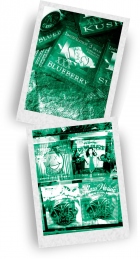WHAT IS A SYNTHETIC DRUG?
Synthetic drugs are created using man-made chemicals rather than natural ingredients.
A number of synthetic drugs on the market, including Ecstasy, LSD and methamphetamine, are described in other booklets in The Truth About Drugs series. This booklet gives the facts about “synthetic marijuana” (Spice or K2), “synthetic stimulants” (Bath Salts) and a drug known as “N-bomb.” These are among the synthetic drugs known as “designer drugs.”
DESIGNER DRUGS — A RISKY EXPERIMENT
To understand what synthetic marijuana and Bath Salts are, and how they came to exist, you have to know what a “designer drug” is. A designer drug is a synthetic (chemically made) version of an illegal drug that was slightly altered to avoid having it classified as illegal. It is essentially an experiment by a chemist done to create a new drug that can be sold legally (on the Internet or in stores), allowing dealers to make money without breaking the law. As law enforcement catches up with new chemicals that are so created and makes them illegal, manufacturers devise altered versions to steer clear of the law. So the cycle repeats.
Some of these drugs are sold over the Internet or in certain stores (as “herbal smoking blends”), while others are disguised as products labelled “not for human consumption” (such as “herbal incense,” “plant food,” “bath salts” or “jewellery cleaner”) to mask their intended purpose and avoid health and safety rules.
Due to the constantly growing number of chemicals that are developed, designer drug users have no way of knowing what the drugs they take might contain. Further, as a small modification made to a known drug may result—and often does—in a new drug with greatly different effects, users cannot predict the impact on health from the substances they experiment with.
Between 2011 and 2014, in the United Kingdom scores of new synthetic drugs were identified.1 In the past ten years, more than 650 new designer drugs have flooded into Europe, primarily manufactured in China and India, then repackaged and distributed throughout the continent. Some of these drugs contain chemicals that have still not been completely identified, and whose effects on the human body and mind are unknown.2
REFERENCES
- “DEA News: Huge Synthetic Drug Takedown,” Drug Enforcement Administration news release, May 7, 2014.
- Study by Recreational Drug European Network, 2013.












